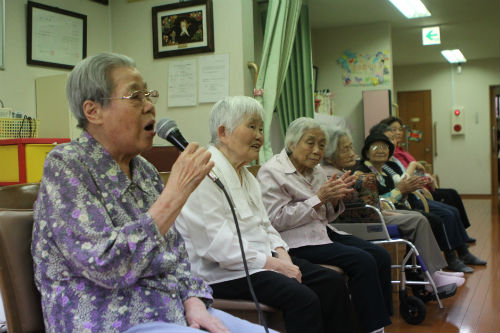교토 노인복지시설 에루화 방문기

“We Help Each Other to Live Together.” It is the catchphrase of ‘Eruhwa’, a welfare facility for the elderly Koreans in Kyoto, Japan. Kim Do-dae(78) said, “We are like family in Eruhwa.” She is one of the first generation Korean residents in Japan who immigrated to Japan during the Japanese colonial period and she has been living in the country all of her life. They had been plagued by discrimination and poverty for a long time due to their nationality─North or South Korean. Though Japan’s policy for them has become relaxed and their situation has improved, the Chonnam Tribune met the first generation Korean residents in Japan and looked into their lives.
A Comfortable Place for Korean Residents in Kyoto
Eruhwa is short for Non-Profit Organization Corporation Kyoto Korean Life Center located on Higachi-Kujo in Kyoto, Japan. This organization was established in 2000 in order to provide welfare services for the elderly Koreans needing relevant assistance. Many Korean residents living in Kyoto, especially first and second generations, come to the center and talk with each other, watch Korean TV programs, sing many Korean songs, and eat a Korean style lunch together. Kim Do-dae said, “In this place, I practice gymnastics, sing songs and draw pictures. I am very happy when I am here.” “Eruhwa” means “Oh, what fun!” in Korean and is an expression to add to the amusement while singing or dancing in Korean culture. Like this word, Korean elders spend joyful time together at the center and this center functions like a reception room for them. The organization also provides various services for them, which include day care services, life support services and accommodation for visitors. Many volunteers help the Korean elders’ in their daily lives in various ways, such as going shopping with them, taking a bath, and so on.
Who Are the Korean Residents in Japan?
Now, there are nearly six hundred thousand people of Korean heritage who are descendants of those who moved to Japan during the period of Japanese Occupation from 1910 to 1945. In those days, many Koreans could not make a living in their country, Korea, because of Land Improvement Projects under the Japanese Imperialistic Rule, so many Koreans went to Japan in the 1920s to 1930s. After that, the Japanese Imperialism hauled Koreans against their will and mobilized them for war purposes or labor. On August 15th, 1945, Japan had lost the Second World War, these Korean people wanted to return to their home country.
But only few people could return to Korea because many Koreans had no money for the moving expenses. Most Koreans remained in Japan and since then they have lived with being discriminated against because of their nationality in the country. Kang Jung-soon (80) said, “When I was young, I went to school, but my teacher told me to stand at the back of the classroom. Furthermore, Japanese people discriminated against me because I smelled of Kimchi.”
Nam Soon-hyun (47, Secretary-general of Eruhwa) said, ”The first and second generation Korean residents in Japan were discriminated against only because they were Koreans. They had no formal education and lived a hardscrabble life. Under those circumstances, they could only think of living and surviving. They do not know what hobbies are.” They cannot enjoy their life and they think their life is fruitless. Even though they have lived in Japan for a long time, they have a difficulty knocking around with Japanese seniors.
Remembering the Koreans in Japan
There are many welfare facilities for senior citizens in Japan, but they are not for Koreans with the nationality of Korea in Japan. The reason is that their nationality is not identified in the country. Despite being discriminated against, the Korean residents do not give up their nationality. Secretary-general Nam explained the reason, “Although we live in Japan, Japanese people do not know about us. If we give up our nationality ‘Korean’, it would be that we forget the suffering that Japan caused. I think it is like forgetting both nationality and suffering at the same time.” Their descendants have the same opinion about their nationality. There is a boy who does judo but he cannot take part in a judo match because of his nationality regardless of his level. He is planning to get the nationality of South Korea and to be selected as a member of the national team.
What this reporter saw in the Eruhwa was ‘warmth’, which moved my heart. I was impressed with their love of the country. They showed what sharing and living together are. I will never forget them having smiles on their faces, and living in their second home in Japan. May they are always happy and healthy.
By Lim Seon-young, Student Editor
임선영 기자
ide5287@naver.com

